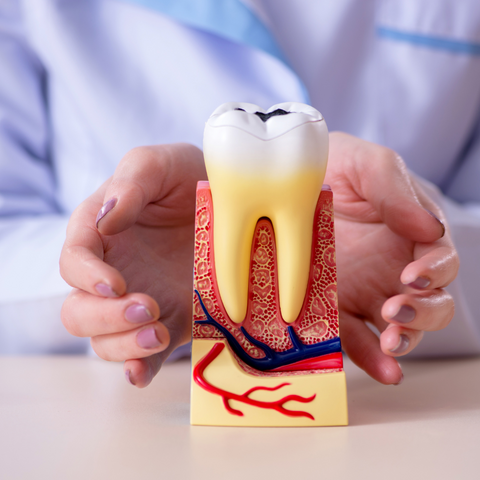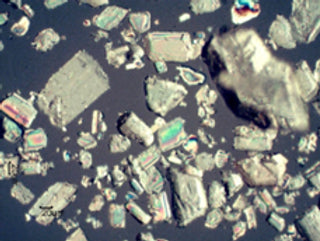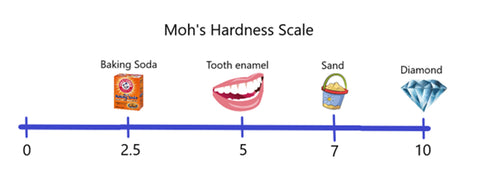Evexia Science Blog – Justin Bosley BSc Nutritional Science, BSc Chemistry – May 06, 2024
Dentures Prevention: Steps You Can Take to Protect Your Gums and Teeth
As you age, your risk of losing teeth increases, but there are ways you can protect your gums and teeth to decrease the chance of needing dentures later in life. Eating a balanced diet, practicing good oral hygiene, brushing your teeth with The Honest Tooth powder, and getting regular dental care are all steps you can take now to support your oral health. Additionally, quitting tobacco use and limiting sugary foods and acidic drinks will help keep your teeth and gums strong. With some diligence regarding your diet and dental care routines, you can maintain your natural teeth for many more years to come. Taking preventive measures today will allow you to continue smiling confidently well into the future.
The Importance of Healthy Gums for Avoiding Dentures
Healthy gums are essential for maintaining your natural teeth as you age. Gum disease, also known as periodontal disease, is one of the leading causes of tooth loss in adults. As gums become inflamed, they pull away from teeth, exposing sensitive root surfaces and creating pockets where more bacteria can grow. If left untreated, the infection can spread into the bone and ligaments supporting your teeth, eventually causing them to become loose or fall out.
Common Causes of Gum Disease as You Age
As you get older, your gums become more susceptible to disease. According to the Centers for Disease Control and Prevention (CDC), in the United States, about 68% of adults aged 65 years and older have periodontal disease [1].
Poor Oral Hygiene
Not brushing and flossing regularly allows plaque to build up on teeth and gums. Plaque contains bacteria that inflame the gums, causing swelling, redness, and bleeding. [2]
Vitamin Deficiencies
A balanced diet with plenty of calcium, magnesium, zinc, vitamins C and D is essential for tooth and gum health [3], [4], [5]. Vitamin C helps maintain the integrity of gum tissue, while vitamin D helps your body absorb calcium and magnesium so that you can regenerate bones and teeth. Vitamin D is also important for immune function so your body does not get overrun with harmful bacteria that leads to chronic inflammation. As you age, stomach acid decreases, making it harder to absorb certain nutrients. [6] There is also a strong independent correlation between H. pylori infection and lower stomach acid levels. Talk to your doctor about supplements like betaine HCl for stomach acid, treatments for H. pylori or diet changes to address any deficiencies.
Dry Mouth
Saliva naturally helps wash away food particles and neutralize plaque acids. However, many older adults experience dry mouth due to medications or health conditions. Drinking electrolyte drinks, chewing xylitol gum, sucking on ice chips, using a humidifier, brushing your teeth with The Honest Tooth and avoiding alcohol or caffeine can help stimulate saliva flow and relieve dry mouth.
Diet and Lifestyle Tips for Healthy Gums
Choose Fiber and Antioxidant-Rich Foods
Fresh fruits and vegetables high in fiber help clean teeth and gums as you chew, removing built-up plaque and food particles. [7] Apples, carrots, broccoli, and beans are excellent options. Most adults need 25 to 30 grams of fiber per day from whole foods.
Antioxidants and bioflavonoids in your diet can help reduce inflammation, promote wound healing, kill bacteria, improve blood flow, and overall, support immune health. Eating foods high in flavonoids such as blueberries, strawberries, purple corn, blue potatoes, and other foods high in purple, red, and blue colors (the color comes from the flavonoids) can help to improve gum health. [8]
Limit Sugary and Starchy Foods
Excess sugar and refined carbohydrates feed the harmful bacteria in your mouth that destroy gums and tooth enamel. Limit sweets, white bread, pasta, and rice which stick to teeth and are digested quickly into simple sugars. Choose complex carbohydrates like whole grains instead, and rinse your mouth with water within 30 minutes after eating to remove plaque-promoting sugars.
Oral Hygiene Habits That Protect Your Teeth and Gums
Floss Daily
Flossing removes dental plaque and food particles from between the teeth and under the gumline, where toothbrushes can't reach. Dental plaque contains bacteria that inflame the gums and damage tooth enamel by producing acids which dissolve your teeth. Make flossing a daily habit to prevent gum disease and reduce your risk of tooth loss. [9]
Visit Your Dentist Regularly
See your dentist for a thorough dental exam and professional cleaning at least twice per year. Your dentist and hygienist can remove built-up tartar from your teeth that you can’t reach at home (unless you brush with The Honest Tooth). They also examine your gums and teeth for signs of damage or disease. Early detection of gum disease or other dental health issues is critical to avoiding tooth loss and more serious complications.
Use a Soft Bristle Toothbrush
Choose a toothbrush with soft, rounded bristles that won’t irritate your gums. Medium or hard bristles can damage your gums over time and lead to recession. Look for a toothbrush that has the American Dental Association (ADA) Seal of Acceptance, as these have been tested to properly clean teeth and gums. Be sure to replace your toothbrush every 3-4 months, or sooner if the bristles become frayed.
Limit Acidic Foods
A diet high in acidic foods and beverages erodes tooth enamel and softens your teeth making it easier for bacteria to invade. Limit colas with phosphoric acid, vinegar-y beverages, and citrus juices. When you do consume these foods and drinks, rinse your mouth with water afterward and avoid brushing for at least 30 minutes. The softened enamel is more prone to damage from brushing right after eating or drinking. [10] Rinsing your mouth with The Honest Tooth after eating acidic foods can also help reduce acid-softening of your teeth.
Natural Remedies to Strengthen Gums and Prevent Dentures
To maintain your natural teeth as you age, it is essential to keep your gums healthy. Several natural remedies can help reduce inflammation, kill bacteria that lead to gum disease and tooth decay, and strengthen your gums.
Brush with Baking Soda
Baking soda is a mild abrasive that helps remove plaque and
surface stains from teeth. Brushing your teeth with baking soda daily can help re
duce plaque buildup that leads to gum disease and tooth decay. The alkalinity of baking soda also helps neutralize acid in the mouth that causes damage to enamel and gums. [11-14]
Use Xylitol-Based Products
Xylitol is a natural sugar alcohol that helps reduce bacteria in the mouth that lead to plaque, tooth decay, and gum disease. Toothpaste, mouthwash, and oral care products containing xylitol can help improve gum health and reduce inflammation. Xylitol also helps neutralize acid in the mouth to prevent damage to teeth and gums. [15-18]
Use Essential Oils
Essential oils like cinnamon and clove have natural antimicrobial properties that help kill bacteria in the mouth that lead to gum disease and tooth decay. These essential oils can help reduce inflammation in gums and have been studied to kill the bacteria that lead to tooth decay. [19-23]
Use The Honest Tooth
The Honest Tooth is a tooth powder with a combination of baking soda, xylitol, cinnamon, and clove essential oils, as well as a special ingredient that fights plaque: monolaurin. The Honest Tooth is scientifically designed to reduce plaque with scientifically proven ingredients to fight tooth decay and gum disease. Monolaurin is our secret ingredient that makes The Honest Tooth remove plaque better than other kinds of toothpaste or tooth powders. It can even remove tarter/calculus, which no other tooth cleaning product can do! It is especially great for getting into places where your toothbrush cannot get and removing plaque from hard-to-reach areas, like braces and retainers! Get your bottle today, with 15% off! Use the code FightPlaque15 at checkout.
Conclusion
While dentures may seem inevitable as we age, there are proactive steps you can take now to protect your oral health and keep your natural teeth longer. Commit to a daily oral hygiene routine, get regular dental cleanings and exams, and tell your dentist about any changes you notice. Maintain a balanced diet low in sugars and acids that erode enamel. Use The Honest Tooth regularly. With diligence and preventative care, you can boost your chances of maintaining your natural smile well into your golden years. Taking control of your oral health future starts today.
References
[1] “Oral Health for Older Americans | Adult Oral Health | Basics | Division of Oral Health | CDC.” Accessed: May 06, 2024. [Online]. Available: https://www.cdc.gov/oralhealth/basics/adult-oral-health/adult_older.htm
[2] R. J. Genco, “Current View of Risk Factors for Periodontal Diseases,” J. Periodontol., vol. 67, no. 10S, pp. 1041–1049, 1996, doi: 10.1902/jop.1996.67.10s.1041.
[3] J. Botelho, V. Machado, L. Proença, A. S. Delgado, and J. J. Mendes, “Vitamin D Deficiency and Oral Health: A Comprehensive Review,” Nutrients, vol. 12, no. 5, p. 1471, May 2020, doi: 10.3390/nu12051471.
[4] U. Van der Velden, “Vitamin C and Its Role in Periodontal Diseases - The Past and the Present: A Narrative Review,” Oral Health Prev. Dent., vol. 18, pp. 115–124, Apr. 2020, doi: 10.3290/j.ohpd.a44306.
[5] A. Togari, S. Arakawa, M. Arai, and S. Matsumoto, “Alteration of in vitro bone metabolism and tooth formation by zinc,” Gen. Pharmacol., vol. 24, no. 5, pp. 1133–1140, Sep. 1993, doi: 10.1016/0306-3623(93)90360-a.
[6] M. Goldschmiedt, C. C. Barnett, B. E. Schwarz, W. E. Karnes, J. S. Redfern, and M. Feldman, “Effect of age on gastric acid secretion and serum gastrin concentrations in healthy men and women,” Gastroenterology, vol. 101, no. 4, pp. 977–990, Oct. 1991, doi: 10.1016/0016-5085(91)90724-y.
[7] H. Swarnamali, N. Medara, A. Chopra, A. Spahr, and T. N. Jayasinghe, “Role of Dietary Fibre in Managing Periodontal Diseases-A Systematic Review and Meta-Analysis of Human Intervention Studies,” Nutrients, vol. 15, no. 18, p. 4034, Sep. 2023, doi: 10.3390/nu15184034.
[8] I. Nawrot-Hadzik, A. Matkowski, P. Kubasiewicz-Ross, and J. Hadzik, “Proanthocyanidins and Flavan-3-ols in the Prevention and Treatment of Periodontitis-Immunomodulatory Effects, Animal and Clinical Studies,” Nutrients, vol. 13, no. 1, p. 239, Jan. 2021, doi: 10.3390/nu13010239.
[9] V. Gupta, A. Dawar, U. S. Bhadauria, B. M. Purohit, and N. Nilima, “Sugar-sweetened beverages and periodontal disease: A systematic review,” Oral Dis., vol. 29, no. 8, pp. 3078–3090, Nov. 2023, doi: 10.1111/odi.14368.
[10] T. Saads Carvalho and A. Lussi, “Chapter 9: Acidic Beverages and Foods Associated with Dental Erosion and Erosive Tooth Wear,” Monogr. Oral Sci., vol. 28, pp. 91–98, 2020, doi: 10.1159/000455376.
[11] A. T. Hara and C. P. Turssi, “Baking soda as an abrasive in toothpastes: Mechanism of action and safety and effectiveness considerations,” J. Am. Dent. Assoc. 1939, vol. 148, no. 11S, pp. S27–S33, Nov. 2017, doi: 10.1016/j.adaj.2017.09.007.
[12] “Baking soda dentifrices and oral health - The Journal of the American Dental Association.” Accessed: Nov. 12, 2021. [Online]. Available: https://jada.ada.org/article/S0002-8177(17)30822-X/fulltext
[13] J. A. Cury, L. N. Hashizume, A. A. Del Bel Cury, and C. P. Tabchoury, “Effect of dentifrice containing fluoride and/or baking soda on enamel demineralization/remineralization: an in situ study,” Caries Res., vol. 35, no. 2, pp. 106–110, Apr. 2001, doi: 10.1159/000047440.
[14] C. Valkenburg, Y. Kashmour, A. Dao, G. A. Fridus Van der Weijden, and D. E. Slot, “The efficacy of baking soda dentifrice in controlling plaque and gingivitis: A systematic review,” Int. J. Dent. Hyg., vol. 17, no. 2, pp. 99–116, May 2019, doi: 10.1111/idh.12390.
[15] V. Ahuja, M. Macho, D. Ewe, M. Singh, S. Saha, and K. Saurav, “Biological and Pharmacological Potential of Xylitol: A Molecular Insight of Unique Metabolism,” Foods, vol. 9, no. 11, p. 1592, Nov. 2020, doi: 10.3390/foods9111592.
[16] E. Söderling and K. Pienihäkkinen, “Effects of xylitol and erythritol consumption on mutans streptococci and the oral microbiota: a systematic review,” Acta Odontol. Scand., vol. 78, no. 8, pp. 599–608, Nov. 2020, doi: 10.1080/00016357.2020.1788721.
[17] V. Loimaranta, D. Mazurel, D. Deng, and E. Söderling, “Xylitol and erythritol inhibit real-time biofilm formation of Streptococcus mutans,” BMC Microbiol., vol. 20, no. 1, p. 184, Jun. 2020, doi: 10.1186/s12866-020-01867-8.
[18] K. Salli, M. J. Lehtinen, K. Tiihonen, and A. C. Ouwehand, “Xylitol’s Health Benefits beyond Dental Health: A Comprehensive Review,” Nutrients, vol. 11, no. 8, p. E1813, Aug. 2019, doi: 10.3390/nu11081813.
[19] H. A. Gandhi, K. T. Srilatha, S. Deshmukh, M. P. Venkatesh, T. Das, and I. Sharieff, “Comparison of Antimicrobial Efficacy of Cinnamon Bark Oil Incorporated and Probiotic Blend Incorporated Mucoadhesive Patch against Salivary Streptococcus mutans in Caries Active 7-10-year-old Children: An In Vivo Study,” Int. J. Clin. Pediatr. Dent., vol. 13, no. 5, pp. 543–550, Oct. 2020, doi: 10.5005/jp-journals-10005-1818.
[20] K. Ács, V. L. Balázs, B. Kocsis, T. Bencsik, A. Böszörményi, and G. Horváth, “Antibacterial activity evaluation of selected essential oils in liquid and vapor phase on respiratory tract pathogens,” BMC Complement. Altern. Med., vol. 18, no. 1, p. 227, Jul. 2018, doi: 10.1186/s12906-018-2291-9.
[21] B. Lapinska et al., “An In Vitro Study on the Antimicrobial Properties of Essential Oil Modified Resin Composite against Oral Pathogens,” Mater. Basel Switz., vol. 13, no. 19, p. E4383, Oct. 2020, doi: 10.3390/ma13194383.
[22] M. Khan, H. Z. Alkhathlan, and S. T. Khan, “Antibiotic and Antibiofilm Activities of Salvadora persica L. Essential Oils against Streptococcus mutans: A Detailed Comparative Study with Chlorhexidine Digluconate,” Pathogens, vol. 9, no. 1, p. 66, Jan. 2020, doi: 10.3390/pathogens9010066.
[23] K. Wiwattanarattanabut, S. Choonharuangdej, and T. Srithavaj, “In Vitro Anti-Cariogenic Plaque Effects of Essential Oils Extracted from Culinary Herbs,” J. Clin. Diagn. Res. JCDR, vol. 11, no. 9, pp. DC30–DC35, Sep. 2017, doi: 10.7860/JCDR/2017/28327.10668.





Comments
2 comments
Grew up using baking soda for toothpaste. When fluoride was added to toothpaste my Mom definitely refused to let us use it. So much controversy back then. Never had a cavity! It works…
Great article